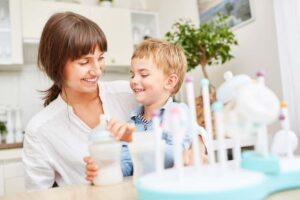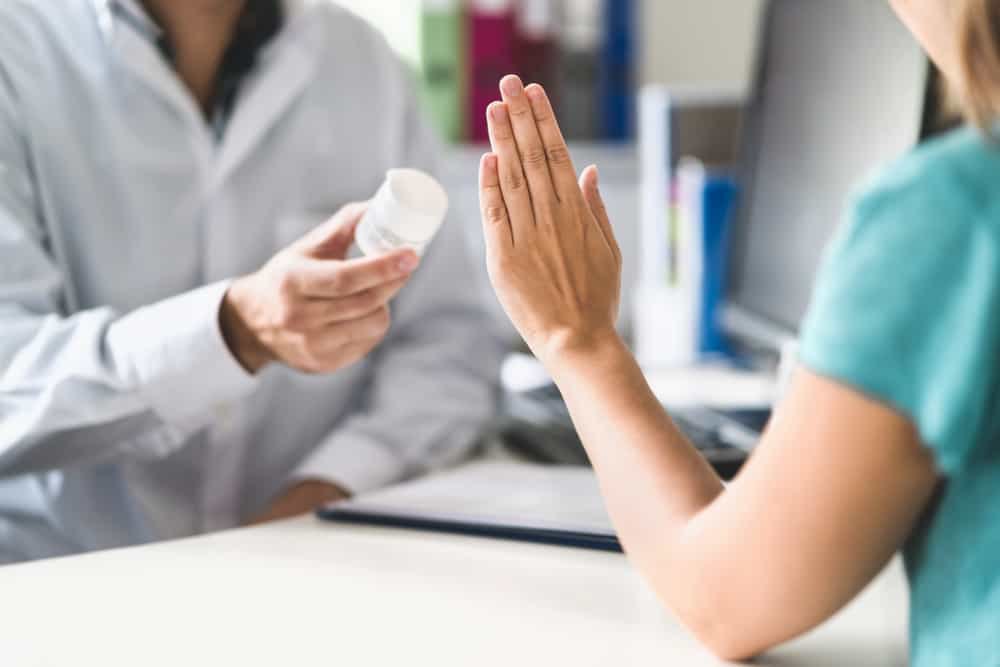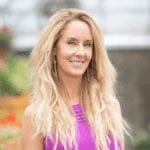Before You Give Your Child Antibiotics, Antacids, or ADD Meds: What a Holistic Pediatrician Wants You To Know

This is an excerpt from an interview I did with holistic pediatrician Elisa Song, MD, for the Toxic Home Transformation Summit.
You can also access the other segments of this interview, which include:
*Poop, Porn, and Vaping: Awkward Conversations You Must Have With Your Teens
*Your Child’s Toxic Burden
*Is Your Baby’s Bedding Toxic?
Here, Dr. Song talks about antibiotics, antacids, ADD meds, and other drugs commonly prescribed to children.
Robyn: Okay. I want to do a rapid fire response about some of the controversial issues in pediatrics. I’m looking for the 60-second version on each topic, sharing what you as a holistic pediatrician would say that’s different than a standard pediatrician.
I’m looking for whether there any links between the toxicity in our environment, food, or whatever. Just say what comes to your mind first when I say these words.
Let’s start with breastfeeding. Does a breastfed baby have a better chance at having healthy detoxification pathways? Is there any kind of link there?
Elisa: What I tell parents is that during the time of infancy, the gut and the immune system are changing and developing rapidly. Breastfeeding and the mode of delivery, like a C section or vaginal birthing, have so much influence on a baby’s developing gut microbiome.
We need your baby to have the best optimal gut microbiome possible. That will give them the best chance of detoxifying and clearing toxins and having healthy immune and brain responses.
Breastfeeding has so many different benefits. It has probiotics, lactoferrin that helps support healthy bacteria, glutamine that supports the small intestinal lining, and HMOs (human milk oligosaccharide) that support the growth of healthy bacteria and keep away the unhealthy bacteria in the intestines.
Breast milk also helps that gut mature, because all babies have intestinal permeability–which is a “leaky gut” that matures at about six months of age. Breast milk supports the baby’s gut, brain, and immune system. Even a little breastfeeding is better than nothing.
Robyn: I was told to wean my first baby after six months, and I regretted it so deeply. I feel like I caused his major autoimmune disease and failure to thrive at 15 months. I think the fact that I weaned him on to formula probably had a lot to do with that.
I didn’t know better, and so I am certainly not shaming any moms who make different choices. Some women can’t breastfeed. If you can’t breastfeed, what’s the next best alternative for feeding an infant?
Elisa: The next best alternative would be an organic formula. I don’t recommend going immediately to soy, but there are organic cow’s milk formulas that have more whey in them. Whey is the protein in milk that’s less allergenic and irritating.
More and more formulas are actually adding in benefits from breast milk like DHA and omega 3 essential fatty acids. These are naturally found at high quantities in milk and support the development of the IQ, brain, eyesight, and all of that.
Some formulas also add probiotics and prebiotics, and some add in HMOs. There are studies showing that formulas that have added human milk oligosaccharides can the shape the microbiome composition in a way similar to breastfeeding.1 With this evidence, we can take steps to try to make formula as much like breast milk as possible.
Robyn: Which brands do you recommend?
Elisa: I typically recommend European formulas like HiPP. You can find it in the states. There’s also an organic goat milk formula by Holle. None of them is perfect, but we match as much as possible.

You can find homemade formula recipes online, and if you decide to go that route, please find a nutrition consultant or a doctor who can make sure you’re including the right ingredients to nourish your baby’s brain and body.
No matter what, try not to look back at your decisions with guilt. Of course, as parents, you feel guilty about things that happened in the past, but that guilt leads to stress–and stress is as much of a toxin as anything we put in our bodies.
Getting rid of that emotional stress can be challenging, but it’s key to staying healthy and preventing illness.
Robyn: Yes. Learning how to be a person who lets go of small hurts and forgives easily is one of the very best things you can do for your health–along with all these ideas to decrease exposure to chemical toxins.
Let’s talk about the toxicity of antibiotics and the long term effects of antibiotics on children. I decided not to give my children antibiotics and to try other treatments instead.
To support a patient like me, what would you say works?
Elisa: I do want to talk about antibiotics and antacids, because we have this epidemic of babies being put on Zantac and antacid medications for reflux. I want to discuss how we can naturally support a baby’s gut when they’re colicky and spitting up instead of relying on these types of drugs.

Allergic diseases like anaphylactic reactions, asthma, allergies, environmental food allergies, and hives were all hugely increased for many of these kids. At least 50% developed one or more allergic diseases in that timeframe.
The researchers speculate that it’s because antacids disrupt the developing infant’s gut microbiome, and that informs the immune system and the brain development.
There’s a time and a place for everything, but it’s important to work with a practitioner who reserves some treatment until it’s really necessary. For example, you can try probiotics, fermented foods, bone broth, and glutamine before jumping straight to antacids or antibiotics.
When we have what I call natural medicine’s tool kit, we can get our kids through a good number of infections without needing antibiotics.
Ear infection is a perfect example. In over 15 years of practice, I can count the number of times where I’ve needed to use antibiotics for an ear infection on the fingers of both hands!
Robyn: I read a study in PubMed 20 years ago that shows that over 80% of the time, ear infections aren’t caused by bacteria, they’re caused by viruses. Antibiotics don’t work on viruses, so you expose your child to those negative impacts for no reason. Is that still the case?
Elisa: I would say it’s probably close to 50-50, but even if it’s bacterial, that doesn’t necessarily mean you need antibiotics.
What I try to do with Healthy Kids, Happy Kids is point out the research from my perspective as a board certified pediatrician. I show parents the research on some of the harms of conventional treatments and on the benefits and the effectiveness of natural treatments. Sharing that research is more effective that telling them to do this or that.
I teach kids, parents, and grandparents how to use evidenced-based diet and lifestyle changes, herbs, homeopathic medicines, essential oils, and acupressure points to get kids over the most common illnesses.
This helps them to get sick less frequently and prevents the issues involved with prescribing antibiotics, like superbugs. Those are scary from a public health standpoint, and if we have superbugs, we need to know how to treat them naturally.
Robyn: Yes. We talked about superbugs 20 years ago and now they are happening. RISA acquired at hospitals is killing people.
I’m so excited that there are holistic pediatricians that parents can go to for help now. There’s more support and empowerment for parents who want to ask questions and do things differently.
My first pediatrician made fun of my natural remedies, but the last one I sought out even supported my alternatives to dealing with ear infections, and even wart removal–and explained to a couple of my children why the natural remedy I wanted to try first, worked, and encouraged them to do it!
This was very helpful to me, and empowering. She, my last pediatrician, was a mother of 6 young children herself. She supported me in not following the vaccine schedule, and I was successful 100 percent of the time, with her and with the previous pediatricians who got angry with me and so I had to fly under the radar, in those cases–at avoiding antibiotics.
Elisa: Absolutely. I want to tell parents that if you ever feel pressured to do something and you’re getting that “gut feeling,” you have every right to stop. Tell your doctor you want to think about it or discuss it and make a decision without being pressured or bullied. If they don’t understand, they aren’t the right doctor for you.
You should never leave an appointment feeling like a deer in headlights or feeling like you were run over by a truck. Leave your appointments feeling like you had a great conversation, know what to expect, and feel empowered to make good decisions for your child.
Robyn: I appreciate that empowerment for parents because we are ultimately in charge. Tell me your thoughts on the ADD and Ritalin and Adderall epidemic.
Elisa: I see parents who want to try to avoid Ritalin or get kids off of Ritalin. A lot of practitioners and patients are still looking for that one magic bullet, and there just isn’t one.
We can talk about the issues that lead up to ADD, but once your kids are having attention and behavioral issues, you have to look at your child from the whole child perspective, including looking at the gut, brain, and immune system and detoxification.
Giving your child Ritalin won’t suddenly change your child into a well-behaved kid who focuses on his work and has positive self-esteem and great friendships.
Work on their gut first. Get rid of all the food dyes, preservatives, and additives, and get them on a whole foods diet, and/or supplement with a whole foods-based multivitamin. You will help your kid so much, and even if they need Ritalin, they’ll need so much less.
Ritalin has a lot of side effects. All stimulant medications can cause tics and appetite suppression or affect weight and growth. Over the long-term, this is not necessarily going to be the answer. If you start a kid at seven years of age on Ritalin, where does it end? Adults don’t just grow out of ADHD and ADD.
Take that root cause approach and make sure they’re getting everything that they’re missing–like omega 3 essential fatty acids, Vitamin D, Zinc, magnesium, and all those great nutrients. Kids who have sensory, behavioral, and attention issues are highly sensitive to artificial colors, preservatives, flavors, and sweeteners. Get that out of their diets, because that literally is poison to some of our kids’ brains.
For kids with sensory issues, if you look at your kid’s gut and their diet and remove the toxins, your kid will be so much healthier and will thrive and be pleasant. You’ll love being with your kid, and you’ll love who you are as a parent because you won’t have to nag them to get their homework or chores done.
Get my free wallet card: How To Spot Neurotoxins On Food Labels
Your kid will thrive, and you’ll improve your relationship. It sounds simple, but it’s not a quick fix. It’s not necessarily an easy road, but it is so worth it.
Robyn: That was a brilliant and helpful message to end on. Thank you so much for what you’re doing for so many families. So many small children will be healthier as a result of your work. Tell us where everyone can find you online.
Elisa: Thank you. The best place to find me is on my blog, HealthyKidsHappyKids.com, where I post articles and share research, evidence, and information on how to treat different conditions naturally. You can also check out my Facebook page at Dr. Elisa Song MD.
I try to post the latest research that I find, but one of the best places for new parents exploring this integrative approach to find a community is the Thriving Child Community Facebook group.
It’s growing, and we have thousands of parents around the world who are all committed to helping our kids thrive naturally. There are practitioners, parents, grandparents, teachers, and even a therapist. It’s a fantastic community, so that’s where I would start as a parent looking for community and support.
Robyn: Wonderful. Thank you so much.
Dr. Elisa Song is a holistic pediatrician in Belmont, CA, and can be found at Whole Family Wellness. She runs the Thriving Child Summit and teaches thousands of parents and children how to regain their health when facing autism, ADD, anxiety, chemical sensitivities, food allergies, and more at HealthyKidsHappyKids.com.

She has a FREE video masterclass you can sign up for here, to learn how she got herself, and her kids, off the Standard American Diet, to lose 70 pounds and ditch 21 diagnosed diseases.
Disclosure: This post may contain Affiliate links that help support the GSG mission without costing you extra. I recommend only companies and products that I use myself.
Resources
1. Lars Bode; Human milk oligosaccharides: Every baby needs a sugar mama, Glycobiology, Volume 22, Issue 9, 1 September 2012, Pages 1147–1162, https://doi.org/10.1093/glycob/cws074
2 Mitre E, Susi A, Kropp LE, Schwartz DJ, Gorman GH, Nylund CM. Association Between Use of Acid-Suppressive Medications and Antibiotics During Infancy and Allergic Diseases in Early Childhood. JAMA Pediatr. Published online April 02, 2018. doi:10.1001/jamapediatrics.2018.0315
Posted in: 12 Steps To Whole Food, Health Concerns, Natural Remedies, Relationships
















No comments found, but you can be our first!